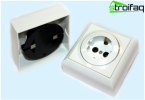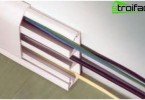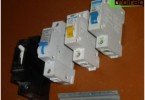LED street lighting
Energy-saving technologies are actively used in the world. In 2012, Austria and Germany abandoned sodium lamps, completely switching to LED street lighting. The same trend is emerging in the CIS countries. LED lights are installed on highways, tunnels, railway platforms, in parks and squares, at various public and private facilities. Many owners of personal plots prefer to use them today, using them as elements of landscape design. After all, with their help you can not only save money, but also create a beautiful light frame for ponds, fountains, road surfaces, borders and protective fences. Every year, more and more knowledgeable people become knowledgeable about this advanced electrical technology, which is rapidly entering our daily lives. If you want to join their number and be in the know, we recommend that you familiarize yourself with the material below. It will help you to get a complete picture of street LEDs, their design, types and features of use..
Content
- Positive and negative aspects
- List of compelling benefits
- Details on a number of disadvantages
Positive and negative aspects
Recall that under the external (street lighting) is meant architectural lighting, as well as lighting of streets and roads, squares, parks, squares, household plots, open industrial facilities with the help of appropriate (in this case LED) lamps.
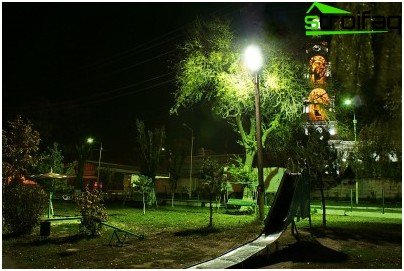
Outdoor LED lighting – a unique design element and a way to ensure safety
List of compelling benefits
- Energy saving. Lanterns with this type of lamp consume one and a half, or even two times less electricity than ordinary ones. At the same time, their luminous flux is comparable in power with fluorescent lamps. They do not cause overloading of power supply lines, which contributes to savings on their repair and maintenance.
- Durability. The service life for continuous use is from 11 to 15 years, and when lit exclusively at night – up to 25 years.
- Structural strength, protection from the negative effects of the environment. LED outdoor lighting fixtures, as a rule, are not equipped with a glass bottle, which makes them very resistant to external influences. The casing of these devices is designed so that dirt, bird stool, debris and water do not accumulate on their surface and do not impair cooling ability. They can be used in almost any climatic conditions, in the range of operating temperatures from – 60 to + 45̊ С.
- Reliability. They have anti-vandal protection. LED streetlights are explosion and fireproof, have high contrast light, turn on very quickly and work silently. They have no flicker.
- Color rendering. LEDs have excellent color rendering characteristics, the index of which and the color shade can be selected for a specific application of the lamp. Their light parameters are optimal, contributing to the best concentration of attention of road drivers on the road. In addition, their light has been proven to have therapeutic properties..
- Inertia is almost absent in LED lamps: they have good performance. This is a very significant factor, especially important for their use in the construction of traffic lights..
- These are environmentally friendly devices. LED lamps for street lighting do not require any special disposal, as they do not contain either mercury or its derivatives, as well as other harmful or toxic substances.
- Easy installation. Easy to install. On 1 lamppost, you can install 2 similar lamps.
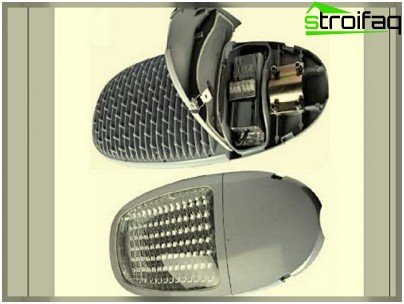
Street LED lights are structurally protected from external negative influences
Details on a number of disadvantages
- The disadvantages of these devices include a high price. However, despite the tangible initial investment, their use provides significant savings in the future..
- LED street lighting is subject to thermal degradation. In order for such a lamp to work normally, it needs high-quality heat dissipation. This function is performed by the substrate on which the LEDs are soldered. But if they are soldered poorly, this will lead to the formation of cavities that violate the heat dissipation and, as a result, damage to the lamp.
- Also, these devices are very sensitive to voltage drops. If a failure occurs in the power supply network, the operation of the lamp may be disrupted due to overheating of its body. If the case temperature and the temperature of the sealant are equal, then the device may fail.
- A street LED lamp may break due to dysfunction of the electrodes, which are indispensable in the design of this device. The metal of which they are composed is subject to diffusion. If it occurs, there will be a great risk of metal particles getting into the semiconductor’s area of effect. This may cause a malfunction..
Design and classification of devices
Device specific features
The functioning of the LED is based on the principle of emission of light waves resulting from an electrical impulse.
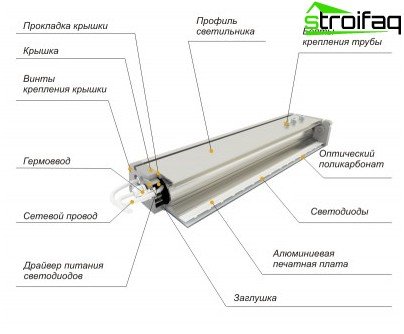
A street lamp with LEDs is a kind of complex of semiconductor devices, i.e. LEDs, which are mounted in a light and durable aluminum housing, coated with protective paint.
Street lights are structurally different from their indoor counterparts. In accordance with the PUE (Electrical Installation Rules) they are mounted on poles from 4 to 11 m in height, so that the light flux is directed down. Usually 2 luminaires are mounted on 1 support using stainless steel brackets. Devices suggest the ability to adjust the color characteristics of radiation and light flux.
Types of LED street lights
Street lights on LEDs can have the form of searchlights, lamps, and also can be represented by devices for decorative street lighting (duralex, duralight, rulers and grids).
1. Searchlights. Industrial – installed mainly at large facilities. With their help, they illuminate the streets near sports complexes, illuminate the facades of buildings, open areas, parking lots and other outdoor objects with a large territory. Small spotlights are installed on personal plots. They can have both white and colored light at different angles of radiation..
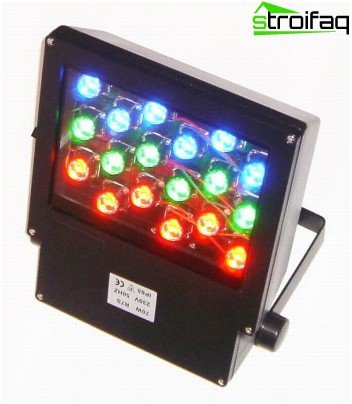
LED floodlight can emit any spectrum light
2. Flashlights. Highways, large highways are usually lit with lamps with reflectors that allow directing light in different directions, and lamps with a capacity of up to 400 watts. On secondary roads, flashlights of 150 – 250 watts are used. Garden and park areas, sidewalks, squares, courtyards and household plots are illuminated at night by up to 150 watts of diffused light from street lamps..
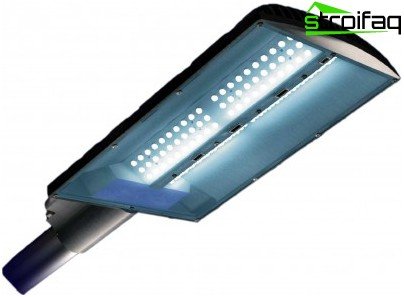
LED street lamp work equally well in any weather
3. The duralight lamp looks like a transparent plastic tube or tape with a large number of LEDs inside, which are located at a distance of 1.5 – 27.5 mm from each other. This device is used for contour architectural lighting, in landscape design for decorating objects (poles, trees, etc.), advertising lighting. The luminaires are connected using a special coupling, can be connected to a 2- and 4-channel controller, and are characterized by a long service life. They have varieties:
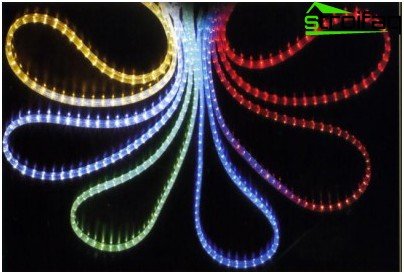
Duralight is mainly used for creating contours in landscape design.
- Fixing – work in constant light mode.
- Chasing – with their help, dynamic street lighting is carried out.
- Multi-Chasing – Dynamic Luxury LED Lighting.
- Chameleon – street lighting with a controller.
4. Duraflex differs from other similar devices in water resistance, lightness and increased flexibility, which simplifies the operation and installation of the lamp. It can be fixed on any surface and in any environment. Very often used as decorative landscape lighting.
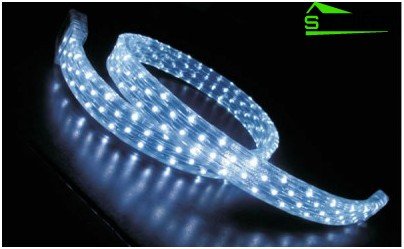
Duraflex – LED street lamps that are completely unresponsive to moisture
5. The line has the form of a flexible thin plastic tape with a silicone braid, on which powerful LEDs are mounted in an upright position. Attractive technical characteristics of the line are its low-voltage safe voltage (12 V) and long service life. Often used as decorative advertising light..
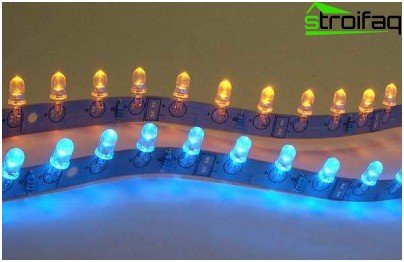
The line – LED street lamps operating at safe low voltage
6. A grid is a device in the form of a light network with LEDs in nodes. It is very bright, shockproof, economical and easy to install. It is pulled on a rigid frame between the supports to decorate the wall of the structure or the territory of the park. It has many modifications.
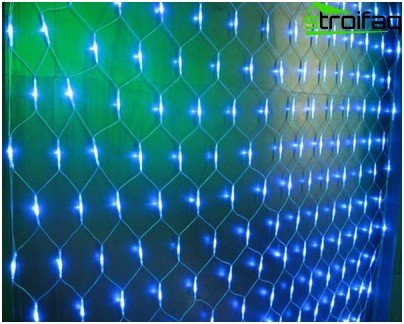
LED mesh features shock resistance and ease of installation
The division for creating color radiation
It is worth noting that street LED lights are able to emit light of different colors of shades, including white, the most useful and pleasing to the eye.
However, the latter is not easy to obtain, the methods vary. Depending on them, the lamps are classified:
- According to RGB technology: blue, green and red LEDs are located in the substrate of the device. A certain plus of this technology is a very powerful light emission, and a minus is the property of light to “float” as the device ages.
- Color mixing technology: an LED capable of emitting in the ultraviolet range is placed on the substrate of the device. Then red, blue and green phosphors are applied to it. After mixing the colors, the result is a white glow. Such lamps are inexpensive, but in them phosphors fail quite quickly, which leads to a decrease in the quality of the glow.
- The next technology is that a yellow phosphor is applied to the blue LED. The green and red LEDs are attached to the resulting blue color. Mixing produces white light. Advantages and disadvantages – as with technology No. 2.
- ZnCe technology of semiconductors: on a ZnCe substrate, the semiconductor is a blue LED. As a result, light of a bluish tint is studied. Allowed the operation of devices at a voltage of 2.7 V. Typical resistance to electrostatic discharges. However, their service life is short.
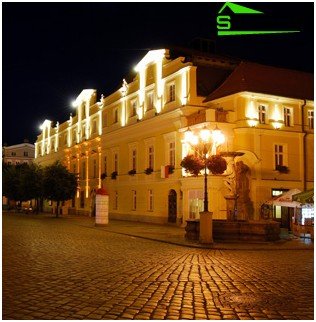
White light of LED street lamps
Organization of street LED lighting
Regardless of whether LED illumination of streets, large objects or small personal plots will be carried out, these works are carried out according to the standard scheme, consisting of a set of measures:
1. First, it is necessary that specialists draw up a lighting project that includes:
- calculation of brightness, illumination and other indicators in accordance with SNiP and PUE. At this stage, the issues of the location of the lamps, the technology of light control, etc..
- drawing of the lighting scheme;
2. According to the project, lighting devices are selected.
3. Then the equipment is installed.
4. Maintenance of these devices is mandatory.
As you can see, the choice of street LED lamps is quite rich. They can effectively decorate any private property and at the same time decently save. It is possible that LED technology will be the best solution to the lighting problem of your real estate. It definitely deserves attention, and it is obvious that in the near future its application will be widespread..


